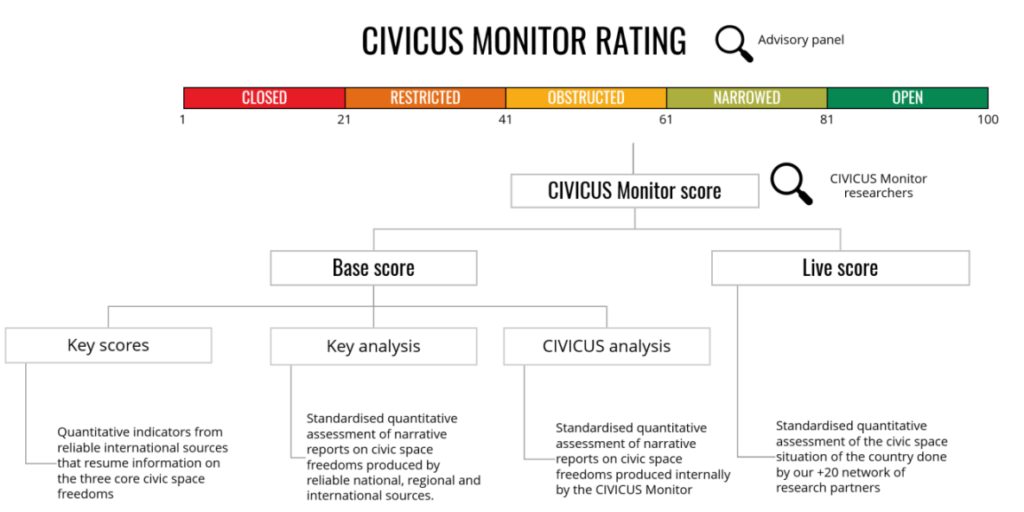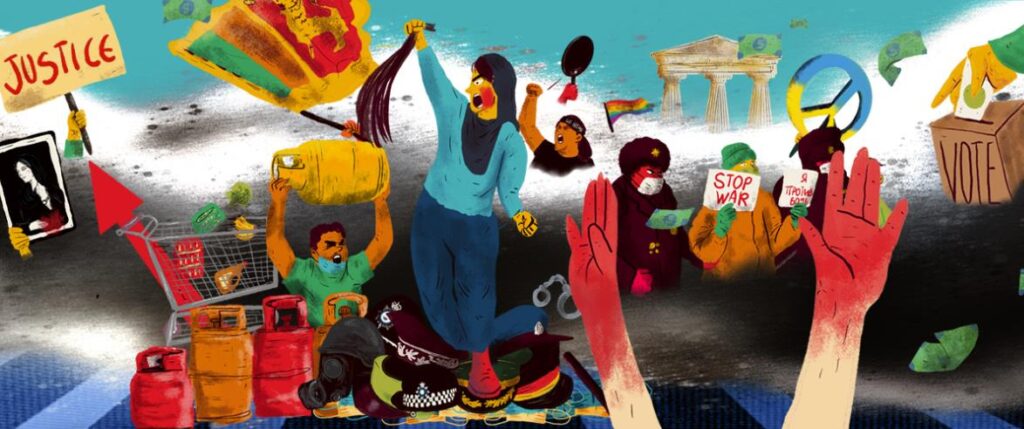Table of Contents
GENERATING TIMELY KNOWLEDGE AND ANALYSIS
CIVICUS Monitor
For its seventh year, the CIVICUS Monitor curated data and information on civic space for 197 countries and territories. For the first time we published the numbers behind the scores and updated the methodology. In response to civil society requests, we created targeted country briefs, infographics and Watchlist reports. We captured 316 citations of these knowledge products across academia, civil society, intergovernmental organisations and media. These included citations by the British daily newspaper The Guardian, which extensively referenced CIVICUS Monitor data and its reasoning for downgrading the UK’s civic space to ‘obstructed’ in March 2023. Monitor statistics were also cited by the UN, including in the UN Development Programme’s 2023 publication on youth participation.


CIVICUS Watchlist
The CIVICUS Monitor also provided data to power our campaigning efforts. For example, a Sri Lanka Watchlist country report was actively used to support advocacy and solidarity efforts with networks in the country and region. Monitor data also fed into a report on the state of civic space in Sri Lanka submitted to the 137th session of the UN
Human Rights Committee ahead of the review of the state’s implementation of its obligations under the International Covenant on Civil and Political Rights in March 2023. Along with 12 international organisations, we also released a public statement calling for the end of police repression of protests in Sri Lanka.


Interviews
All our research is of, from and for civil society. Our analysis draws from in-depth interviews and other consultations with civil society activists, leaders, experts and others close to the major stories of the day.
Our interviewees bring in valuable information, contribute to fact- checking and provide a civil society perspective on current issues. In 2022-23, a high and growing share of our interviewees were from the global south and belonged to one or more of our target groups, a materialisation of our goals to project a global south perspective and prioritise the narratives of historically marginalised groups.

CIVICUS Lens
Building on 10 years of State of Civil Society Reports, CIVICUS Lens offers timely analysis of the major events of the day from a civil society perspective. Complementing our ongoing tracking of civic space on the CIVICUS Monitor, CIVICUS Lens highlights stories of civic action and civil society breakthroughs. It explores contemporary political, economic and social trends and their impact on civil society, and also and most importantly, the ways in which people’s movements are responding, innovating and scoring victories.
CIVICUS Lens is intended to demystify complex issues, encourage reflection and promote solidarity, allyship and progressive action. It showcases a plurality and diversity of experiences and voices, including through interviews and consultations. In 2022-23, CIVICUS Lens analysis was systematised into a shorter State of Civil Society report focused on the year’s civil society trends. Through new media partnerships established in 2023, its contents are also being repackaged in more accessible formats to reach wider audiences.

CIVICUS’S GROWING IMPACT
CIVICUS is a trusted source of information, and the use of its publications is increasing in number, scope and impact. For instance, the CIVICUS Monitor team attended expert meetings organised by financial institutions in the Netherlands to explore how financial institutions can strengthen human rights risk assessments of business activities in areas where civic space is restricted. The meetings led to the publication of a report, ‘No news is bad news’, that references CIVICUS’s definition of civic space and 2021 Monitor findings included in its People Power Under Attack publication. Among the 11 expert contributors to the discussion were CIVICUS’s Chief Programmes Officer, Mandeep Tiwana, and Civic Space Research Cluster Lead, Marianna Belalba Barreto. The report suggested the CIVICUS Monitor as a source of information when performing risk assessments.
It may also be useful to add to these processes information from civil society, such as from the CIVICUS Monitor, regarding the quality of information available for a specific geography. The existing CIVICUS Monitor provides red flags about restricted civic space on a country basis. This can provide a useful indication of the level of risk and the quality or completeness of risk information, even before specific risks are assessed.



LEARNING QUESTION: What critical components need to accompany our knowledge and analysis to improve its value to our target groups?
The quality of our knowledge products, our media outreach strategy and close partnership with local groups directly affected by the issues we raise have played a key role in enabling the uptake of our analyses by media and advocacy platforms in a range of contexts, as evidenced by citations of our work.
CIVICUS produces high-quality grounded research products supported by regional research partners and interviews with civil society stakeholders. We have long held a strong reputation for our products with international bodies, but have recently obtained broader recognition, including as a verified Google News source last year.
Information is timely. Monitor updates, Lens stories, interviews and open letters are being released just before events happen or while they are still ongoing. For instance, an interview by David Kode, CIVICUS’s advocacy and campaign lead, with International Press Service about civic space conditions in Nigeria, which called for allowing protests and rallies, was released just before the Nigerian elections. It highlighted that if people were not allowed to protest peacefully, they might resort to violence to have their voices heard. The interview emphasised participating in the elections as a way to make change happen.
Our credibility has helped amplify our partnerships to reach a wider and more diverse audience. Some of the proven outreach tactics used this year have included the continuous and consistent use of key international days and events to do targeted outreach, increased engagement with the CIVICUS Online Community, launching reports in different countries and collaborating with well-established media houses in a particular region or country. We have partnered with the Mail and Guardian in South Africa, and established partnerships with outlets such as Inter Press Service and Alliance Magazine to publish and cross-post content.
Our wide media uptake amplifies the voices of civil society on the ground, empowering and legitimising their existence and work at a time of increasingly daunting challenges. Several members and partners have highlighted the importance of sharing successful tactics as a way of encouraging other CSOs to use them.
